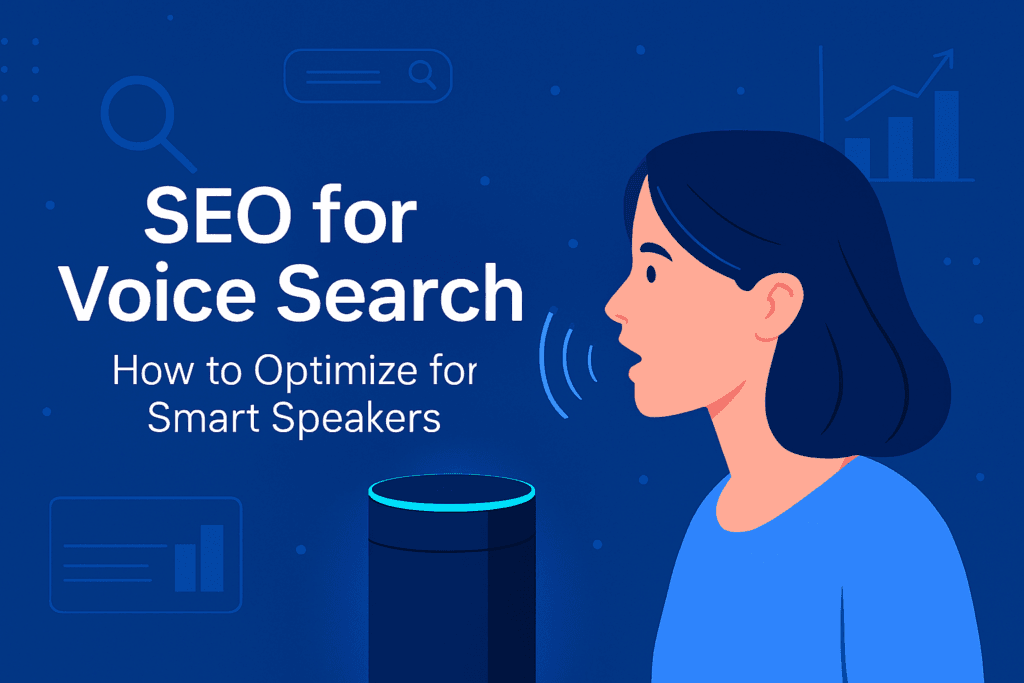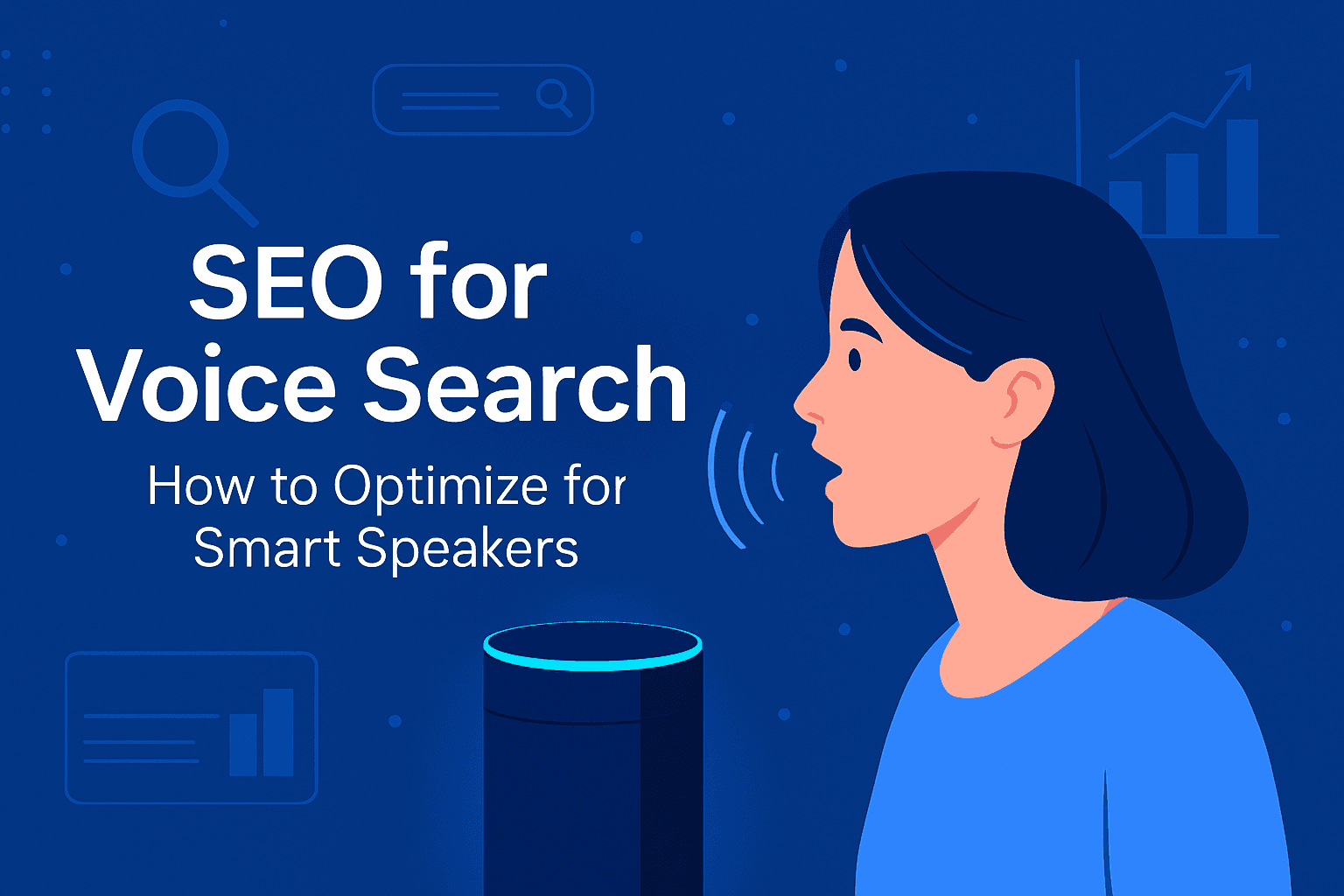Voice search is transforming the way people interact with search engines. With the rise of smart speakers like Amazon Alexa, Google Nest, and Apple HomePod, optimizing for voice search has become crucial for businesses and content creators. In this guide, we will explore how to optimize your website for voice search to ensure better visibility and engagement.

What is Voice Search SEO?
Voice Search SEO refers to the process of optimizing your website’s content so that it appears in voice search results. Unlike traditional text-based searches, voice queries are conversational and longer. They are often used for local searches, quick answers, and transactional queries.
Why is Voice Search Optimization Important?
Voice search is rapidly growing, and businesses that fail to adapt may miss out on significant traffic. Here are some key reasons why optimizing for voice search is essential:
- Growing Popularity: More users are relying on voice search for daily tasks.
- Mobile-First Indexing: Most voice searches come from mobile devices, making mobile-friendliness crucial.
- Local Search Benefits: A significant percentage of voice searches are local, helping businesses attract nearby customers.
- Improved User Experience: Voice search provides quick and accurate responses, enhancing user satisfaction.
How to Optimize for Voice Search
1. Use Natural and Conversational Language
Voice search queries are typically longer and more conversational than text-based searches. To optimize for these, focus on:
- Using long-tail keywords that mimic how people speak.
- Writing content in a question-and-answer format.
- Avoiding overly technical or robotic language.
For example, instead of targeting “best smartphones 2025”, optimize for “What are the best smartphones in 2025?”
2. Focus on Featured Snippets
Featured snippets (also called position zero) are the top results in Google search that voice assistants often read aloud. To optimize for snippets:
- Provide concise answers in 40-50 words.
- Use structured data to help search engines understand your content.
- Format content using bullet points, lists, and tables.
Example of a Featured Snippet Optimization:
Question: What are the benefits of voice search?
Answer: Voice search helps users get quick answers, improves accessibility, and enhances local search results. It is also hands-free, making it useful while driving or multitasking.
3. Optimize for Local Search
Since many voice searches are location-based (e.g., “restaurants near me”), optimizing for local SEO is crucial. Steps to enhance local SEO include:
- Claiming your Google My Business profile and keeping it updated.
- Including local keywords like city and neighborhood names.
- Encouraging customer reviews, which improve credibility.
Key Local SEO Factors for Voice Search
| Factor | Description |
|---|---|
| Google My Business | Keep address, phone number, and hours updated. |
| Local Keywords | Use phrases like “near me” and city names. |
| Online Reviews | Positive reviews improve local rankings. |
4. Improve Website Speed and Mobile Friendliness
Voice search is predominantly used on mobile devices, so a slow website can hurt rankings.
Ways to Enhance Website Speed:
- Optimize images to reduce load time.
- Use browser caching to store frequently accessed files.
- Minimize HTTP requests and enable lazy loading.
Google’s PageSpeed Insights tool can help analyze and improve website speed.
5. Implement Schema Markup
Schema markup helps search engines understand your content better, making it more likely to appear in voice search results. Use structured data to mark up:
- FAQs and Q&A pages
- Business information (local SEO)
- Product details
You can use Google’s Structured Data Markup Helper to implement schema markup easily.
6. Optimize for Question-Based Queries
Since most voice searches are in question format, creating content that answers specific queries is beneficial.
Common Voice Search Question Starters:
- Who (Who won the World Cup in 2022?)
- What (What is the best pizza place near me?)
- When (When does the store close?)
- Where (Where can I find a gas station?)
- Why (Why is the sky blue?)
- How (How to cook pasta?)
Using FAQ sections on your pages can improve visibility for these queries.
7. Create Audio-Friendly Content
Since voice search relies on spoken responses, ensure your content is easy to pronounce and free of complex jargon.
- Avoid long, complex sentences.
- Use short paragraphs with a conversational tone.
- Test your content by reading it aloud.
Future of Voice Search SEO
The future of voice search is evolving rapidly. Here are some trends to watch:
- AI-Powered Search: Smart assistants are becoming more intelligent, personalizing results.
- Voice Commerce Growth: More consumers are shopping via voice search.
- Multilingual Voice Search: Support for multiple languages will expand global reach.
- Integration with IoT: Smart home devices will enhance voice search experiences.
Businesses that stay ahead of these trends will have a competitive advantage.
FAQs About Voice Search Optimization
1. What are the best tools for voice search SEO?
Some useful tools include:
- Google Search Console (Tracks voice search queries)
- Google My Business (Enhances local SEO)
- AnswerThePublic (Finds question-based queries)
- Schema.org (Implements structured data)
2. How does voice search impact traditional SEO?
Voice search favors longer queries, natural language, and direct answers. While traditional SEO still matters, content must be optimized for conversational search.
3. Do smart speakers use different search engines?
Yes.
- Amazon Alexa uses Bing.
- Google Assistant uses Google Search.
- Apple Siri uses Google and Bing.
4. How long should content be for voice search optimization?
Content should be concise yet informative. Answers that range from 30 to 50 words work best for voice search results.
5. Is voice search optimization different for mobile and smart speakers?
Yes. While mobile searches may include visual results, smart speakers rely solely on spoken answers. This makes structured, direct responses more important.
Conclusion
Voice search is changing the SEO landscape, making it essential for businesses to optimize for smart speakers and voice assistants. By focusing on natural language, local search, featured snippets, and structured data, you can improve your visibility and stay ahead of the competition.
As voice technology continues to evolve, adapting your SEO strategy will ensure long-term success in this dynamic digital world.
Would you like assistance with keyword research for voice search in Hindi for your website?
